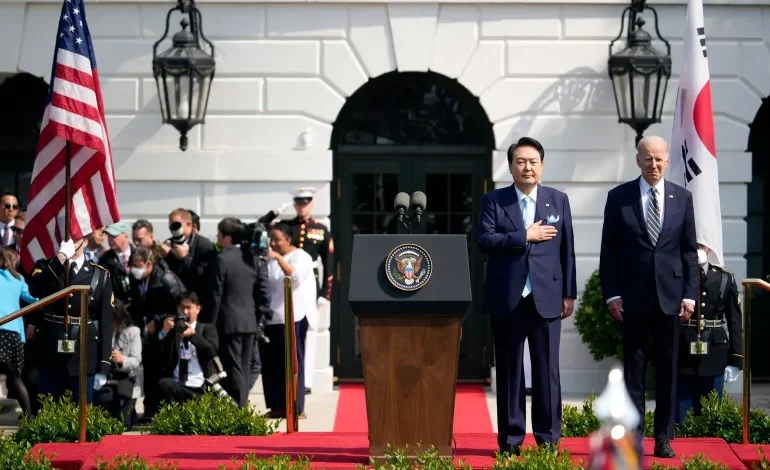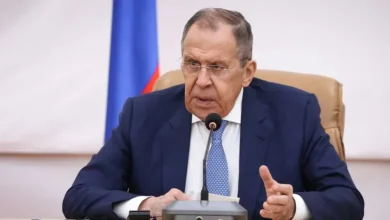US nuclear subs to dock in South Korea to deter Pyongyang: Biden

United States President Joe Biden and South Korean President Yoon Suk-yeol have pledged to strengthen deterrence against North Korea, including sending nuclear-armed US submarines and other military assets to South Korea.
Biden and Yoon discussed the new agreement between the two countries, dubbed the “Washington Declaration”, in a joint news conference following their meeting in Washington, DC to mark the two countries’ 70-year alliance.Yoon is only the second leader, after France’s Emmanuel Macron, to be hosted in an official state visit at the White House since Biden took office in 2021, which his administration said underscored the priority Washington is giving to a key ally in the Indo-Pacific region.
Yoon said the new deterrence agreement represented an “unprecedented expansion and strengthening” of the bilateral strategy. It came as North Korea increased the pace of its weapons testing and unveiled an apparent recent breakthrough in its pursuit of solid-fuel intercontinental ballistic missiles.
“President Biden has reaffirmed his ironclad commitment to extended deterrence for the Republic of Korea,” Yoon said.
He added that the countries agreed to “immediate bilateral presidential consultations in the event of North Korea’s nuclear attack, a promise to respond swiftly, overwhelmingly and decisively using the full force of the alliance including the United States’ nuclear weapons”.
The countries will also set up a “nuclear consultative group” to share strategy and information related to North Korean threats, Yoon said. The group will discuss ways to plan and execute joint operations “that combine Korea’s state-of-the-art conventional forces with US nuclear capabilities”.
For his part, Biden said that, while the agreement will increase cooperation in the event of an attack by North Korea, he will maintain “sole authority” to use a nuclear weapon.
“The bottom line here is even closer cooperation, closer consultation, and we’re not going to be stationing nuclear weapons on the [Korean] Peninsula,” Biden said. “But we will have visits, port visits, of nuclear submarines and things like that. We are not walking away from that.”
Speaking to reporters prior to the news conference, three Biden administration senior officials told reporters on the condition of anonymity that the submarine deployments will be a significant component of a wider strategy.The deployment of nuclear-armed submarines to the Korean Peninsula “has not happened since the early 1980s”, one senior official told reporters, explaining that they would be part of an array of “strategic assets” that would be regularly deployed to South Korea “to make our deterrence more visible”.
The deployments would include a “regular cadence” of other major assets, “including bombers or aircraft carriers”, the official said.“We’ll strengthen our training, our exercises and simulation activities to improve the US-ROK [Republic of Korea] alliance’s approach to deterring and defending against DPRK [Democratic People’s Republic of Korea], including by better integrating ROK conventional assets into our strategic planning,” the official said, referring to South and North Korea by their official acronyms.
US nuclear-armed ballistic missile submarines made frequent port visits to South Korea in the late 1970s during the Cold War, a period when the US had hundreds of nuclear warheads stationed in South Korea.
In 1991, the US withdrew all of its nuclear weapons from the Korean Peninsula. The following year, Seoul and Pyongyang signed a joint declaration pledging that neither would “test, manufacture, produce, receive, possess, store, deploy or use nuclear weapons”.
But as Pyongyang has repeatedly violated the joint declaration over the years, there has been increased support in South Korea for the US to place nuclear weapons in the country again.
A poll released on April 6 by the Asan Institute for Policy Studies in Seoul found 64 percent of South Koreans supported developing nuclear weapons, with 33 percent opposed.
Meanwhile, stepped-up testing by North Korea, including the flight-testing of a solid-fuel intercontinental ballistic missile for the first time earlier this month, have further heightened concerns. The test was seen as a possible breakthrough in Pyongyang’s efforts to acquire a more powerful, harder-to-detect weapon that could target the continental US.










